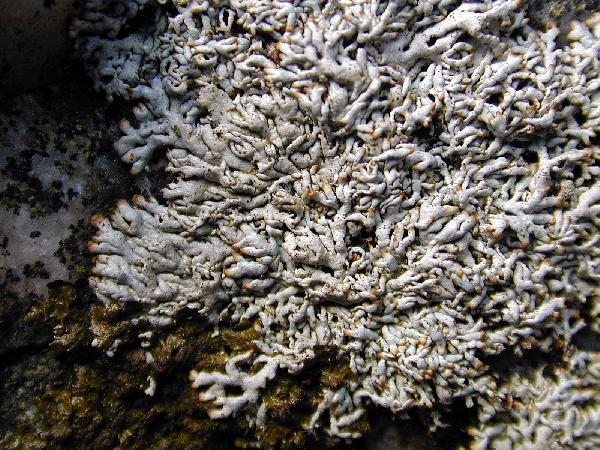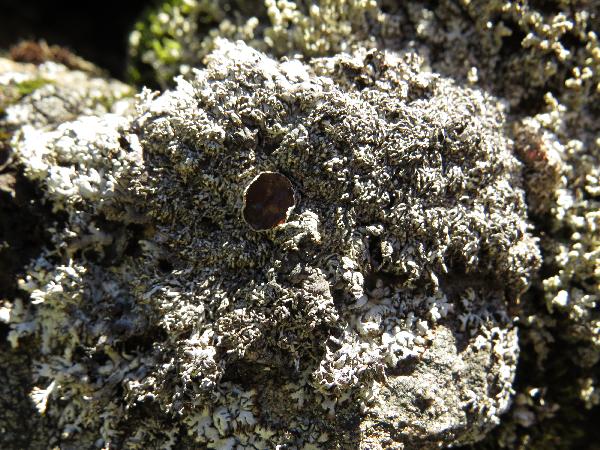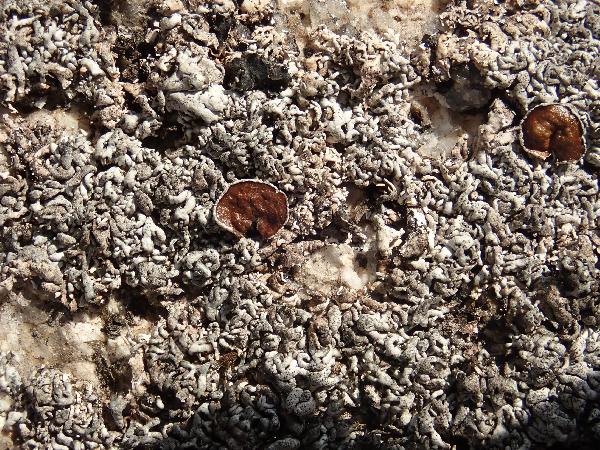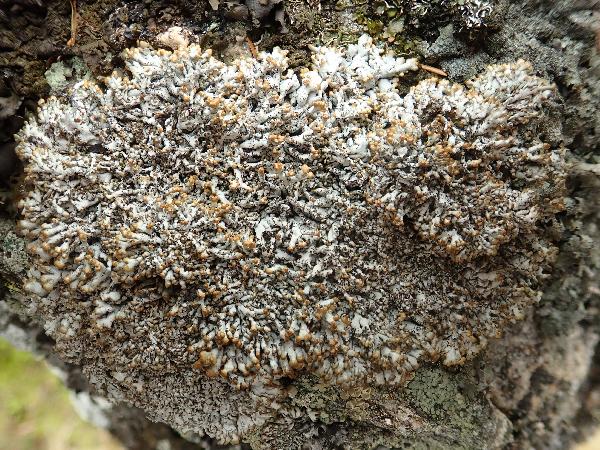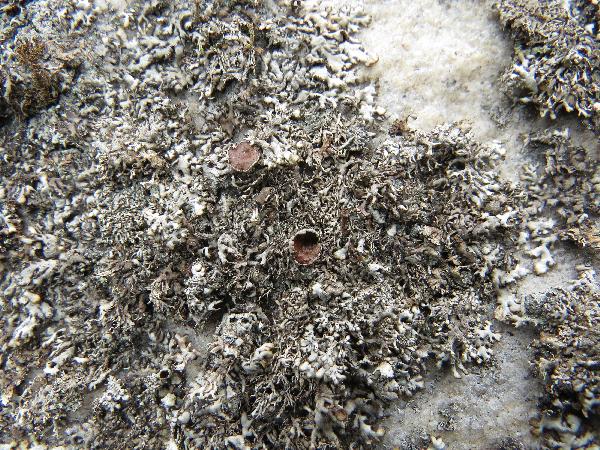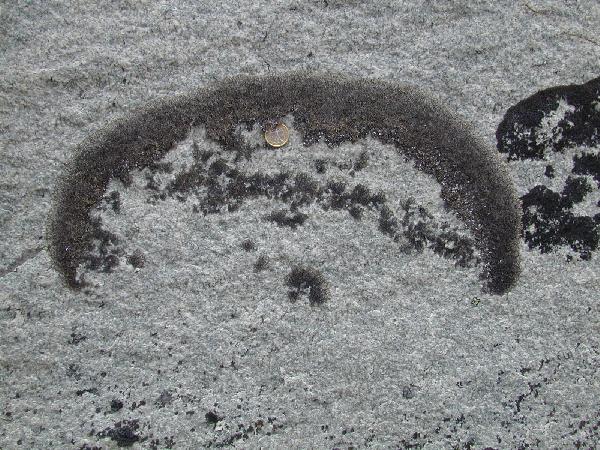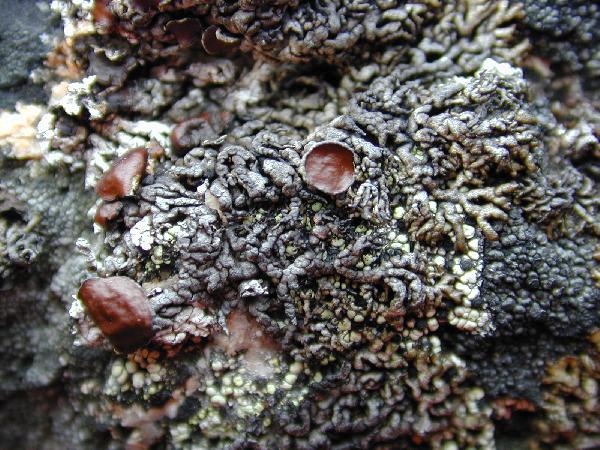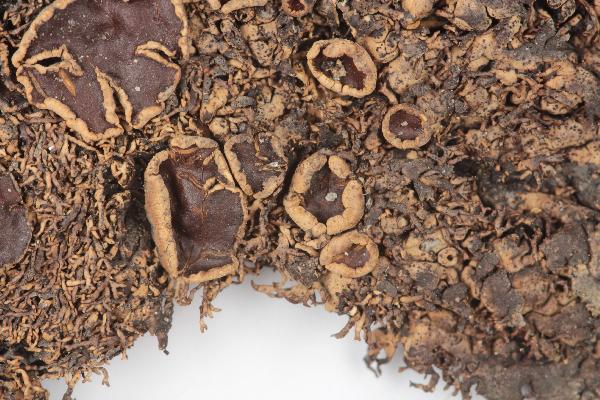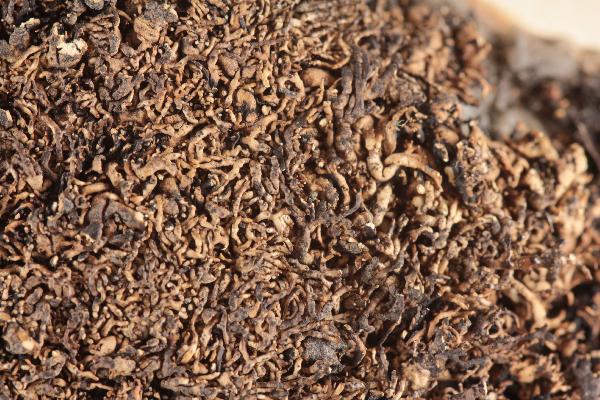Brodoa intestiniformis (Vill.) Goward
Bryologist, 89: 222, 1986. Basionym: Lichen intestiniformis Vill. - Hist. Pl. Dauphiné, 3: 947, 1789.
Synonyms: Hypogymnia encausta (Sm.) Walt. Watson; Hypogymnia intestiniformis (Vill.) Räsänen; Imbricaria encausta (Sm.) DC.; Menegazzia encausta (Sm.) Navàs; Parmelia ceratophylla var. multipuncta (Ehrh.) Schaer.; Parmelia encausta (Sm.) Nyl.; Parmelia encausta var. multipuncta (Ehrh.) Th. Fr.; Parmelia intestiniformis (Vill.) Ach.
Distribution: N - Frl (Tretiach & Hafellner 2000), Ven, TAA (Caniglia & al. 2002, Nascimbene & Caniglia 2002c, Nascimbene 2006c, Lang 2009, Nascimbene & al. 2022), Lomb (Rivellini 1994, Dalle Vedove & al. 2004, Gheza 2019, 2019b), Piem (Morisi & Sereno 1995, Isocrono & Falletti 1999, Isocrono & al. 2003, 2004, 2006, Morisi 2005, Isocrono & Piervittori 2008, Favero-Longo & al. 2015), VA (Borlandelli & al. 1996, Piervittori & Isocrono 1997, 1999, Isocrono & al. 2008, Watson 2014, Matteucci & al. 2015c), Emil (Fariselli & al. 2020). C - Sar. S - Cal (Puntillo 1996).
Description: Thallus foliose, heteromerous, dorvisentral, adnate, forming 2-5 cm wide, orbicular or irregular rosettes. Lobes up to c. 2.5 cm long, 0.5-1(-2) mm broad, more or less convex, stiff, contiguous or overlapping; center of thallus with narrower (0.2-0.4 mm), flattened secondary lobules which arise perpendicularly to the surface. Upper surface pale grey to brownish, darkening or blackening especially on the lobules and towards the tips, and there becoming glossy, reticulate-maculate at least in the apical 2-3 mm. Lower surface black, brown toward the tips, smooth to weakly and shallowly wrinkled, erhizinate, with scattered hapters. Upper cortex paraplectenchymatous, the cell walls with Cetraria-type lichenan, with a non-pored epicortex; medulla white, solid; lower cortex paraplectenchymatous, without an epicortex. Apothecia rare, lecanorine, up to 5(-7) mm across, with a dark brown disc and a thin, entire to sublobulate thalline margin. Epithecium brownish; hypothecium and hymenium colourless. Asci 8-spored, clavate, the K/I+ blue tholus penetrated by a faintly amyloid apical cushion with parallel or diverging flanks, the wall K/I-, surrounded by a K/I+ blue outer layer, Lecanora-type. Ascospores 1-celled, hyaline, subglobose to broadly ellipsoid, 10-12 x 6-8 µm. Pycnidia numerous, immersed, the visible part black to grey-brown. Conidia bifusiform, 5-7 x c. 1 µm. Photobiont chlorococcoid. Spot tests: upper cortex K+ yellow, C-, KC-, P-; medulla K+ slowly reddish to orange-brown, C-, KC-, P+ orange, UV-. Chemistry: upper cortex with atranorin and chloroatranorin; medulla with fumarprotocetraric acid.Note: an arctic-alpine to boreal-montane, circumpolar lichen found in more sheltered and less wind-exposed situations than B. atrofusca, on faces of acid siliceous rocks with a long snow-cover, with optimum above treeline; most frequent in the Alps, but also present in the high Mediterranean mountains.
Growth form: Foliose, narrow lobed
Substrata: rocks
Photobiont: green algae other than Trentepohlia
Reproductive strategy: mainly sexual
Commonnes-rarity: (info)
Alpine belt: rather common
Subalpine belt: common
Oromediterranean belt: very rare
Montane belt: absent
Submediterranean belt: absent
Padanian area: absent
Humid submediterranean belt: absent
Humid mediterranean belt: absent
Dry mediterranean belt: absent

Predictive model
Herbarium samples


P.L. Nimis; Owner: Department of Life Sciences, University of Trieste
Herbarium: TSB (12970)
2001/11/22
central lobuli


P.L. Nimis; Owner: Department of Life Sciences, University of Trieste
Herbarium: TSB (35222)
2002/07/12
central lobules


P.L. Nimis; Owner: Department of Life Sciences, University of Trieste
Herbarium: TSB (12970)
2001/11/22
detail of marginal lobes

Courtesy: Olivier et Danièle Gonnet - Source: https://www.afl-lichenologie.fr/Photos_AFL/Photos_AFL_B/Brodoa_intestiniformis.htm
France, Mont Cenis - 2081 m - Savoie
4/8/2011

Courtesy: Olivier et Danièle Gonnet - Source: https://www.afl-lichenologie.fr/Photos_AFL/Photos_AFL_B/Brodoa_intestiniformis.htm
France, Mont Cenis - 2081 m - Savoie
4/8/2011

Courtesy: Olivier et Danièle Gonnet - Source: https://www.afl-lichenologie.fr/Photos_AFL/Photos_AFL_B/Brodoa_intestiniformis.htm
France, Mont Cenis - 2081 m - Savoie
4/8/2011

Ulrich Kirschbaum CC BY-SA 4.0 - Source: https://www.thm.de/lse/ulrich-kirschbaum/flechtenbilder
On acid rocks.
Austria: Alps.
Growth form: Foliose, narrow lobed
Substrata: rocks
Photobiont: green algae other than Trentepohlia
Reproductive strategy: mainly sexual
Commonnes-rarity: (info)
Alpine belt: rather common
Subalpine belt: common
Oromediterranean belt: very rare
Montane belt: absent
Submediterranean belt: absent
Padanian area: absent
Humid submediterranean belt: absent
Humid mediterranean belt: absent
Dry mediterranean belt: absent

Predictive model
| Herbarium samples |


P.L. Nimis; Owner: Department of Life Sciences, University of Trieste
Herbarium: TSB (12970)
2001/11/22
central lobuli


P.L. Nimis; Owner: Department of Life Sciences, University of Trieste
Herbarium: TSB (35222)
2002/07/12
central lobules


P.L. Nimis; Owner: Department of Life Sciences, University of Trieste
Herbarium: TSB (12970)
2001/11/22
detail of marginal lobes

Courtesy: Olivier et Danièle Gonnet - Source: https://www.afl-lichenologie.fr/Photos_AFL/Photos_AFL_B/Brodoa_intestiniformis.htm
France, Mont Cenis - 2081 m - Savoie
4/8/2011

Courtesy: Olivier et Danièle Gonnet - Source: https://www.afl-lichenologie.fr/Photos_AFL/Photos_AFL_B/Brodoa_intestiniformis.htm
France, Mont Cenis - 2081 m - Savoie
4/8/2011

Courtesy: Olivier et Danièle Gonnet - Source: https://www.afl-lichenologie.fr/Photos_AFL/Photos_AFL_B/Brodoa_intestiniformis.htm
France, Mont Cenis - 2081 m - Savoie
4/8/2011

 INDEX FUNGORUM
INDEX FUNGORUM
 GBIF
GBIF
 DOLICHENS
DOLICHENS
















